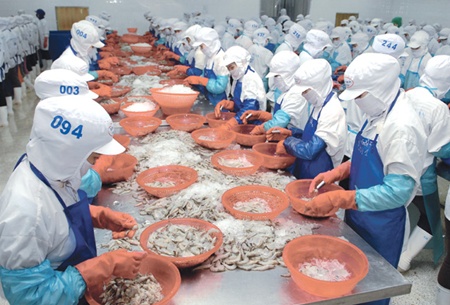|
Exporters to face more anti-dumping lawsuits
A production line for frozen shrimp at a company in central Ninh Thuan Province. Vietnamese exporters should be prepared to cope with an increasing number of anti-dumping and anti-subsidy lawsuits filed by key export markets, heard a conference held yesterday in HCM City. Speaking at the event, Nguyen Chi Mai of the Ministry of Industry and Trade's Viet Nam Competition Authority, said that Vietnamese exporters had faced an increasing number of lawsuits in recent years. From 1994-2007, 20 cases of anti-dumping lawsuits were filed against Vietnamese exports. From 2008 to 2012, the number was 19. In the first eight months of this year, two anti-dumping lawsuits were filed, according to figures from the Viet Nam Competition Authority. Since 2008, four anti-subsidy lawsuits have been filed. In addition to the US and the EU, which have traditionally filed the highest number of such lawsuits, other markets such as South Korea, Canada, India, Turkey, Poland, Columbia and Peru have been doing so as well. Among those markets, Turkey and India have increased their number of anti-dumping and anti-subsidy lawsuits in recent years. Countries in the ASEAN region such as Thailand, Indonesia and the Philippines have also begun to file such lawsuits. Many export markets now file twin lawsuits, both anti-dumping and anti-subsidy, against the same product, according to the agency. Mai said that two-thirds of the lawsuits focused on the top 15 leading exports of Viet Nam, and three-fourths of the lawsuits were filed by Viet Nam's major export markets. Most of the products involved in the lawsuits are those that need manual labourers such as shrimp, fish and footwear and leather. Mai said many of these Vietnamese exports have a significantly higher export turnover than similar exports from other countries, which also face similar lawsuits. The most vulnerable products to such lawsuits are those that developed countries do not have a competitive advantage, she said. Products as chemicals, plastic, rubber, steel, iron, textiles, furniture, machinery, tools and equipment, paper, food and farm products are among the most "sensitive" and face a high risk of having lawsuits filed against them, according to Mai. Challenges Many Vietnamese businesses are not fully aware of the laws related to anti-dumping and anti-subsidy lawsuits, according to the Viet Nam Competition Authority. Another problem facing exporters is the weak auditing and accountancy system in Viet Nam. Many businesses do not store or back up documents, contracts, data, or invoices, creating problems with legal evidence. In addition, most exporters lack experience in dealing with such lawsuits and have not developed plans on how to react to them. Companies also are not fully aware of the healthy competition and fair trade in market economies, and many of them lack awareness of the new challenges they will face when expanding to other export markets. Other hindrances include complicated procedures of lawsuits such as questionnaires, language barriers, technical terms or jargon in legal documents. The strict regulations of export markets are another issue. Regarding the anti-subsidy lawsuits against Vietnamese shrimp exports to the US, the slow reaction from the Government in proving that it did not subsidise exporters caused major problems for companies, Nguyen Huu Dung, VASEP vice president, told Viet Nam News recently. However, despite the negative impact, such lawsuits had prompted exporters to review and improve their auditing and accountancy systems, according to Mai. To cope with lawsuits, exporters should develop long-term, comprehensive strategies for business, investment, markets and products, she said. Early-warning website Speaking at the conference, To Thai Ninh of the Viet Nam Competition Authority described an early warning system that helps Vietnamese exporters predict the possibility of anti-dumping lawsuits filed by major export markets such as the US and the EU. The Early Warning System website in both Vietnamese and English was set up last year by the Ministry of Industry and Trade's Viet Nam Competition Authority. The website aims to alert exporters about Vietnamese products that could be subject to trade remedy measures. The system uses a variety of data sources, sourced mostly from the Viet Nam Customs Department and foreign customs agencies. These include data about trade, market size and trade measures. With the website, businesses can prepare for counter-trade measures, including anti-dumping taxes, and make business production adjustments as well as deal with investigations conducted by foreign agencies. In addition, businesses can more easily maintain operations in a sustainable manner and improve their competitiveness in export markets by monitoring the website information. Reliable trade data, advance warnings and consultation services are also available on the website, Ninh said. — VNS
Newest
Oldest
|
 Print
Print
 E-mail
E-mail
